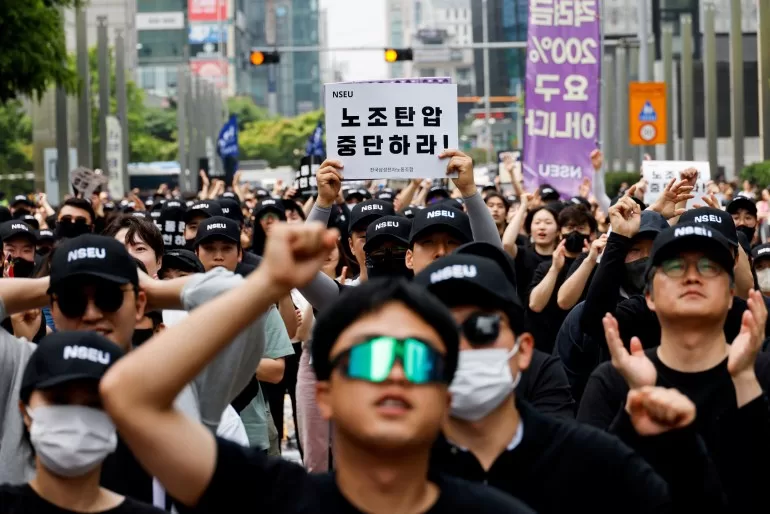National Samsung Electronics Union, which represents tens of thousands of people, is pushing for better wages.
Son Woo-mok, head of the National Samsung Electronics Union (NSEU), which represents tens of thousands of people, said that employees were taking their paid leave entitlements simultaneously on Friday.
“It’s difficult to provide an exact number, but from what I’ve seen of the workplace attendance in the morning, there is a significant difference from the usual,” he said.
Samsung has been locked in negotiations with the unions over pay since January. The company has offered a 5.1 percent pay rise this year, while the union has said that it wants an additional day of annual leave as well as transparent performance-based bonuses.
On Friday, Samsung said it had been “diligently engaging in negotiations and will continue to do so”, and that there had been no impact on production. The company’s chips are used for generative AI, including AI hardware from industry leaders including Nvidia.
“The paid leave usage rate on June 7 is lower than that of June 5 last year,” which, like Friday, was sandwiched between a public holiday and a weekend, the company said in a statement.
About 10 workers held a protest in front of Samsung’s major office in Seoul on Friday, chanting: “Respect labour! We are not wanting a 6.5 percent raise or a 200 percent bonus!”

Samsung Electronics is the flagship subsidiary of South Korean giant Samsung Group, by far the largest of the family-controlled conglomerates that dominate business in Asia’s fourth-largest economy.
At the end of April, it reported a nearly 10-fold jump in first-quarter operating profit to 6.61 trillion won ($4.85bn) thanks to strong sales of its flagship Galaxy S24 smartphone and higher prices for its semiconductors.
Taiwan-based market research firm TrendForce said that while the firm accounts for a significant chunk of the global output of high-end chips, the strike would not affect production because it involves headquarters employees rather than those on the production lines.
Even so, the strike has historical importance, “since Samsung resisted unionisation and engaged in union-busting for so long”, Vladimir Tikhonov, professor of Korean studies at the University of Oslo, told the AFP news agency.
He said the collective action showed that “there is a gradual tendency towards empowerment of labour in South Korea”.
Samsung Electronics prevented the unionisation of its employees for almost 50 years, sometimes adopting ferocious tactics, according to critics, as it turned itself into a global electronics giant.
But in the late 2010s, organisers seized the opportunity presented by the left-leaning government of former President Moon Jae-in, a former rights lawyer who represented trade unions, and controversy around the bribery trial of the company’s then-vice-chairman Lee Jae-yong, the founder’s grandson, to set up a union.
The NSEU now has about 28,000 members, or more than a fifth of Samsung’s total workforce, and is the biggest of the five unions at the company.
Lee Hyun-kook, the union’s vice president, said the strike would not create disruption in production and nor was that the intention.
“We just want Samsung to hear our voice,” he told AFP.
